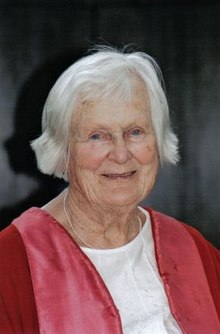Rosemary Murray
| Rosemary Murray | |
|---|---|
 |
|
| Vice-Chancellor of the University of Cambridge | |
|
In office 1975–1977 |
|
| Chancellor | HRH The Duke of Edinburgh |
| Preceded by | John Wilfrid Linnett |
| Succeeded by | Alan Cottrell |
| Personal details | |
| Born |
28 July 1913 Havant, Hampshire, England |
| Died | 7 October 2004 (aged 91) John Radcliffe Hospital, Oxford |
Dame Alice Rosemary Murray, DBE DL (28 July 1913 – 7 October 2004) was an English chemist and educator. She was instrumental in establishing New Hall, Cambridge, now Murray Edwards College, Cambridge, and was the first woman to hold the post of Vice-Chancellor of the University of Cambridge.
Rosemary Murray was born in Havant, Hampshire the eldest of six children born to Admiral Arthur John Layard Murray and Ellen Maxwell Spooner. After attending Downe House, Newbury, she studied Chemistry at Lady Margaret Hall, Oxford. She completed a B.Sc. in 1936, and received a Ph.D. in 1938 for her research on various aspects of isomerism.
Rosemary Murray went on to hold teaching positions at the Royal Holloway College, the University of Sheffield and Cambridge. She served in an impressive array of positions throughout her career:
While at the University of Sheffield (1941–1942) Murray did research on organic chemistry as part of a team working for the Ministry of Supply. In 1942, she joined the WRNS, rising to the rank of chief officer. She worked at Chatham barracks as chief officer directing demobilisation.
A 2013 BBC report describes a secret major control bunker, later buried beneath the lawns of Magee College, Derry, Northern Ireland. From 1941 this bunker, part of Base One Europe, together with similar bunkers in Derby House, Liverpool, and Whitehall was used to control one million Allied personnel and fight the Nazi U-boat threat. Murray was stationed at Base One Europe as WRNS Chief Officer and responsible for the welfare of 5,600 Wrens stationed at Londonderry.
...
Wikipedia
